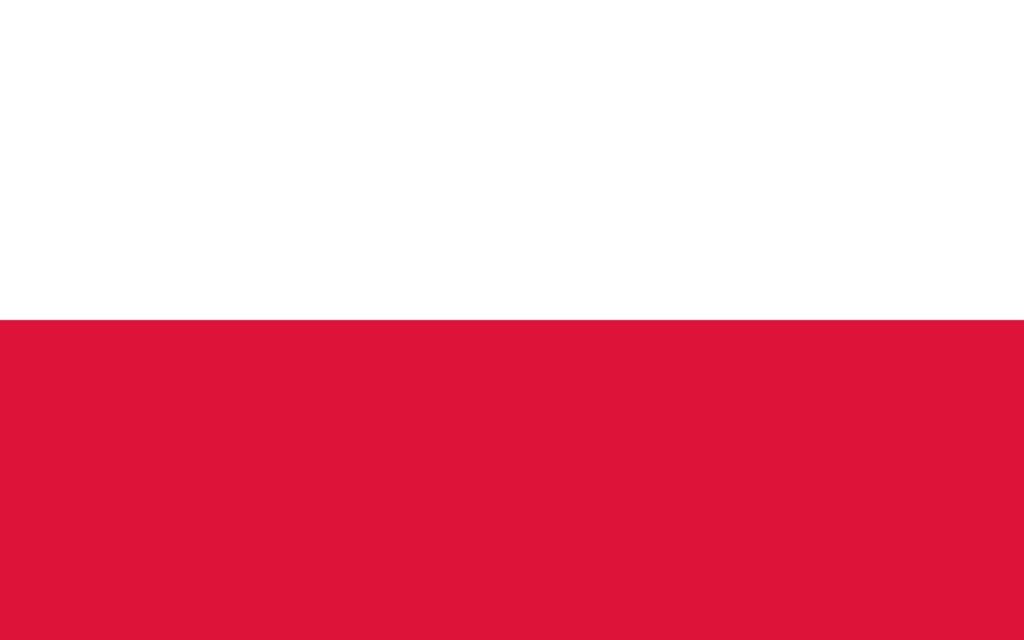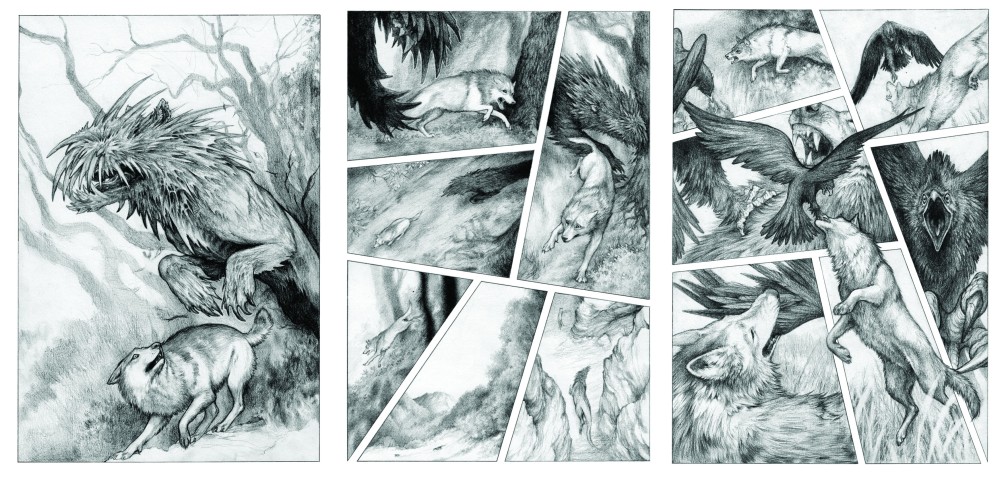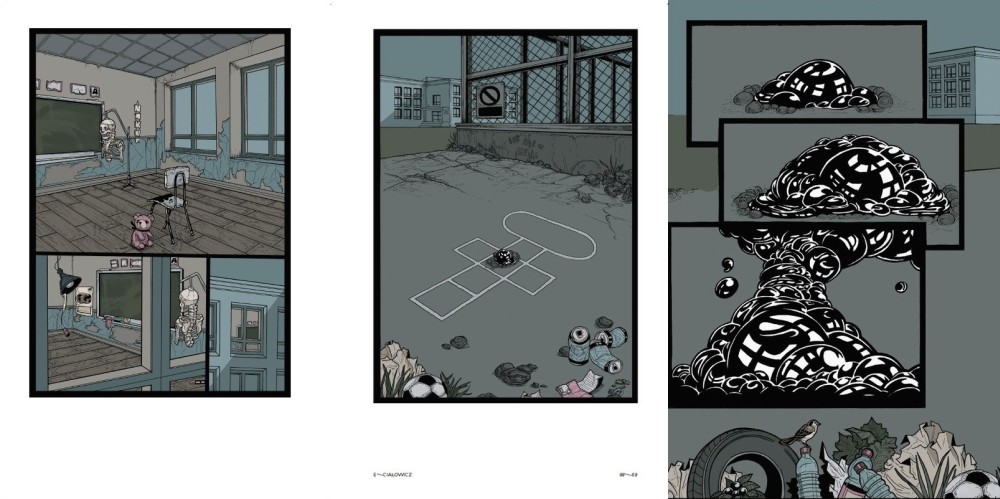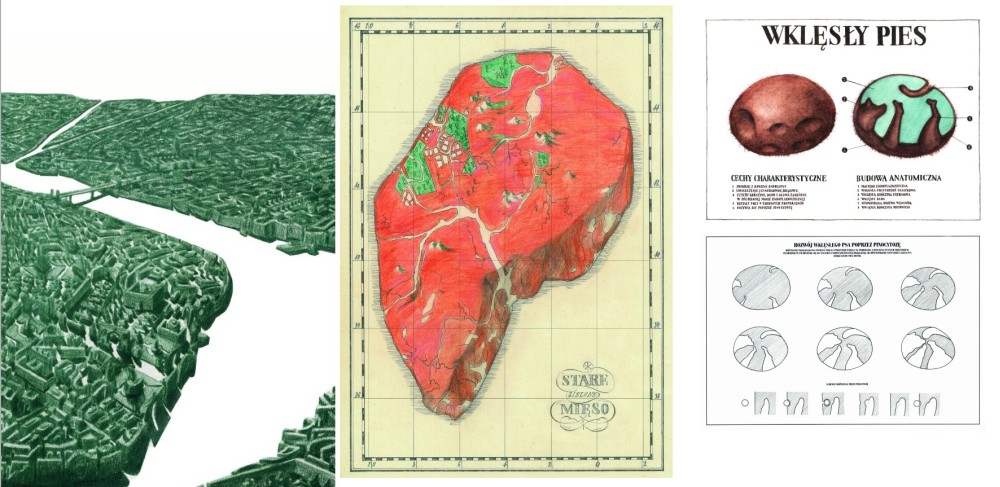We talk about this year’s “Sharp-eye Skills” with professor Dariusz Vasina
Satyrykon: As the Narrative Drawing Workshop (Pracownia Rysunku Narracyjnego), as the name itself suggests, do you tend to tell stories? Are you going to play the part of a Scheherazade at this year’s Satyrykon? Or, having in mind that among many other characters which your students have created is a little-Faustus, are you going to play the little-Scheherazade?
Darek Vasina: The little-Scheherazade doesn’t sound good. And Scheherazade doesn’t sound good either, mainly because of responsibility. As you know, the matter was serious – life was on stake. In a “One Thousand and One Nights” film adaptation there’s a scene in which Scheherazade asks a man in a market place for advice on how to tell the stories in a gripping way. The wise man, a story-teller, gives her an example in his answer. A wise-man is a bit rotund for us, but calling us “attention-catcher”, yes, “attention-catcher” would suit us.
I had a few reasons to ask that way. First of all, we haven’t had much to do with a comic at Satyrykon so far. Although last year “Skills” contained, among others, the presentation of Łódź comic workshop, the variety and amount of other type materials gathered at the exhibition let us contemplate only single frames – like paintings. This time, I felt most fascinated and gripped by “Historie” (Stories) which you sent. Their formal and topical variety, playing with readers’ habits. Honestly, being a lay person (however, probably a neophyte already) I felt a great hunger to get to know about comic as much as possible. Who are you going to address your exhibition (and a catalogue) to? Will you turn to such “difficult cases” as me, too?
The exhibition and the catalogue are meant for everyone. We count on the opinion of professionals as well as people meeting with comic for the first time. “Difficult cases” are most interesting ones. I’m not sure the catalogue will evenly present the comic works in the relation of what is being done in our workshop, as the idea was rather to present a general impression of the workshop. We’ve also given a free hand to an editor designer and are quite anxious to see the final outcome.
Is it possible to learn the art of telling stories (with a picture) just because, for example, you noticed it is profitable? Or is it rather that you need to be born with this ability or curse of changing everything into anecdote (professor Vasina seems to be a good example)?
The art of telling the pictures can be learned. We’ve been trying to teach it for quite a few years already. However, if you want to train yourself in that noble craft, you rather shouldn’t do it counting the profits to come. It’s enough to read some interviews with Polish most famous comic drawers.
In the publishing presenting The Academy of Fine Arts in Kraków, in its part concerning your workshop there’s a photo showing a large (probably rectangular) table and a group of very joyful people around it. The jealousy grabs you and you’d like to be there, right away. Is it a sort of self-promotion trick? What is the method of your work?
In the workshop there are tables which are laid out almost every time before the classes (as we share the room with other Workshops of the Graphics Faculty). During the classes students sit at these tables and draw the task given for the day. The joy you can see in their faces is obviously a promotional trick (laugh). An important place is a small cabinet where we “grill” students with Kuba during their individual correction sessions.
In the text presenting your workshop, we can read that classes are based on series of short exercises meant to stimulate imagination and develop memory, perceptiveness, ability to synthesise and manual skill. I get the impression that the stories, often quite lapidary ones, you tell require the same – perceptiveness, attention and focus – from their viewer. As the humorous history of literature in form of pictograms advertises, the picture might rapidly speed up the process of cognition, although it requires maximum concentration as well. The often quite condensed stories told in your workshop can’t be thoughtlessly flicked through (as we do sometimes with other printed forms). Entering one of your student’s homepage (by the way – the winner of a fast drawing competition) I found a sympathetic (and how refreshing) note asking the reader not to hurry. I feel it refers to majority of your stories and projects. You don’t treat your recipient in a lenient way. No easy facilities or pulp consumption? Either will the viewer focus to the same extend you do in performing your work or they won’t understand much?
We pay a lot of attention to excelling as many details as possible in our work, starting from finding a really interesting, catchy idea, through elaborating the scenario in terms of picture stories, up to a formal layer, the style. All that leads to professionally completed work. We try not to take shortcuts. Particularly Kuba [Jakub Woynarowski] is known for that. But students, especially graduates who need to face reality, are grateful for that demanding attitude of his and his “pressing”. And as I know, in spite of it, they love him and appreciate a lot. They value his knowledge, professionalism, fairness and sense of humour.
And what about the word? What is its meaning in your practice? I noticed that on the one hand, a lot of (majority I suppose) of stories created in your workshop do quite well without words – similarly to e.g. Satyrykon cartoons. But on the other hand, you experiment a lot in different ways: you tear the image and the text apart, you change the order and you play with telling different stories to images which were created prior to them etc. The titles of all workshop related activities (comic independence, out of the head) also present this subtle tendency to play with words. So, do we need the word as such or not?
The word is very important for us. We stress that to our students. The intellectual layer is well appreciated in the workshop. However, we must remember students often don’t have the proper tools to deal with word. There aren’t many subjects at our school which would prepare the students to operate with text. I’m not a professional in that aspect too. We try to encourage students to match a word and an image by giving them some tasks. We learn together, exploring spheres in which we don’t feel professional.
We got used to the fact (although we faced some disappointment too) that following volumes of “Sharp-eye skills” were quite surprising publications for us. The volumes of Warszawa, Katowice, Poznań and Wrocław are the ones we particularly admire and are proud of. But on the other hand, you already have pretty consistent, modern editorial line presenting you workshop output. What should we expect then from Kraków volume of “Sharp-eye skills”?
I don’t want to tell too much too early, but we wanted our catalogue to differ from the “Sharp-eye skills” catalogues printed so far. We assumed it to be rather an art-book than a catalogue understood as documentation of an exhibition. Some pages are supposed to be printed in a screen print technique, the whole of it will be printed on a special paper, the editor designer is also free to edit the works, frame them and even change the colours. We are rather intent on showing the workshop atmosphere than on cataloguing the exhibition. We’ll see what comes of it.
A striking collection of findings from your workshop seems to be the expression of your modesty. You don’t mention e.g. Pucia Prucia and some others… Many of your students are well recognised individuals with quite an output, though you don’t pamper them at all. Frankly speaking, in one of the catalogues you sent, you almost seem to hide what belongs to whom. Is it your method of promotion: instead of praising you rather tend to intrigue and make the viewers start their own search?
Popularity is quite easy to obtain today, take only social media, for example. A student might say e.g.: Why are you saying I need to correct something as this picture has already gained a few thousand “likes”, ha? Fortunately, it still depends on trust. I think they, or at least some of them, still trust us and believe we tell them the truth and they can learn something from us. But, of course, you can always find people who claim they already know everything. Do we brag of our students? Of course we do, although we should rather say we’re very proud of them. Our graduates and students, the things they do, their skills and professionalism are the real measure of our Workshop. If the quality of their work is high, we can sleep well.




